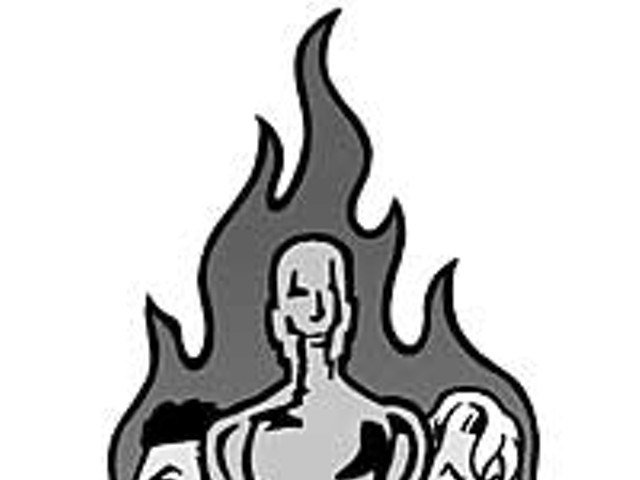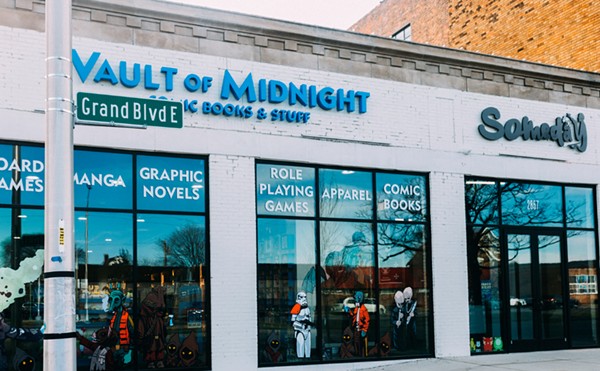For my money, David Fincher's nihilistic serial killer masterpiece Se7en is a superior film to Oscar darling The Silence of the Lambs. Audacious, disturbing and subversive, Fincher's moody thrill ride (his second feature film) simultaneously entertained and criticized its audience. If anything, Se7en was an anti-serial killer movie, deflating the sensational glamour of the genre and punishing filmgoers with a decidedly grim and unsatisfactory ending.
Since then, Fincher's work has been interesting if not always successful. Fight Club, The Game and Panic Room all had varying degrees of brilliance but never ascended to the heights of his Se7en. Fincher lost focus on the people in his films and concentrated on style and plot gimmicks. With Zodiac, he not only expands upon the themes he explored in Se7en, he establishes himself as an A-list auteur.
Spanning more than two decades (1968-1991), the film traces the infamous Zodiac Killer murders and the exhausting investigation that followed. Working from James Vanderbilt's diffuse but mesmerizing adaptation of the book by San Francisco Chronicle cartoonist Robert Graysmith (played by Jake Gyllenhaal), Fincher presents a sprawling, breathlessly meticulous saga of obsession and paranoia. Hopscotching between killings, the police investigation and the dogged pursuit of journalists, Zodiac is epic in scope but intimate in detail.
Fincher puts aside his renowned visual flourishes to tighten the focus on his characters, particularly the Zodiac Killer's collateral victims: the cops and reporters fixated on catching him. What starts as a vicious game of cat-and-mouse soon becomes a draining descent into obsession. The killer's brutally efficient attacks constitute only the first 30 minutes of this two-and-a-half-hour thriller. Fincher instead charts the social and psychological fallout that follows. Years of pursuit relentlessly unspool as the film weaves together a disturbing tapestry of four men who gradually turn into ghosts of their former selves.
Robert Downey Jr. is Paul Avery, a cocky reporter who catches the eye of the elusive killer and, at first, enjoys the celebrity. However, the years of cryptic messages, psychotic boasts and open-ended paranoia begin to haunt the writer. His life and career unravel as fixation turns into personal destruction.
Dave Toschi (Mark Ruffalo) and Will Armstrong (Anthony Edwards) are San Francisco detectives assigned to solve the high-profile murders. Like Avery, they are swept up by the media frenzy, becoming members of the serial killer's cult of celebrity. But time becomes their enemy as years of jurisdictional conflicts, false leads and inconclusive evidence erode their psyches. There's a brilliantly cynical moment where Toschi, exhausted and defeated by years of failure, attends a screening of Clint Eastwood's Dirty Harry. The Zodiac-inspired vigilante fantasy becomes a metaphor for his professional impotence.
Zodiac's linchpin becomes the unassuming and comically wholesome Graysmith. A cartoonist with a penchant for puzzles, his fascination with the case becomes an all-consuming quest to learn the truth. Revisiting long-dead leads and assembling one clue at a time, he slowly reconstructs the investigation long after everyone else has given up. His obsession comes with a high personal cost, however, and his eventual unmasking of the killer is a monument to justice thwarted.
Fincher breaks down every element of the investigation in excruciating but spectacular detail. Unlike the sleuths depicted on CSI, these men worked without computers, cell phones or high-tech analysis. Their case is cobbled together with a string of rickety clues and uncertain hunches. The sheer accumulation of evidence becomes both claustrophobic and thrilling, reeling us in with the same terrible force that must have seduced the real-life investigators.
Amid this onslaught of information, Fincher cannily serves up jarring moments of terror that leave us off-kilter: a casual interview turns into an unsettling moment of impending danger; disturbing phone calls interrupt domestic squabbles. The film gets under your skin and stays there for days. In particular, Fincher's recurring use of Donovan's "Hurdy Gurdy Man" is a chilling metaphor for a psychopath who turns the police and press into circus performers.
Less a high-gloss thriller, Zodiac is a brilliant throwback to the '70s paranoid procedurals of Alan J. Pakula (The Parallax View, All the President's Men, Klute) and Sidney Lumet (Serpico, The Verdict, Prince of the City) and Francis Ford Coppola (The Conversation). Arguably the last great decade of American filmmaking, these dense, fact-based thrillers captured the intense professionalism of men fanatically driven by their work and the psychological scars that resulted.
If rumors of Fincher's Kubrick-like perfectionism are to be believed (it's said he shot scenes as many as 70 times), Zodiac is the ultimate example of an obsessive revealing the inevitable costs of obsession. Though some of the film's stars may have bristled under his painstaking direction, all turn in career-making performances. Don't be surprised to see their names come Oscar time. The cast of supporting actors — Brian Cox, Chloë Sevigny, Elias Koteas, Donal Logue and Philip Baker Hall — is equally brilliant.
Zodiac is the first great film of 2007. Don't miss it.
Jeff Meyers writes about film for Metro Times. Send comments to [email protected].





